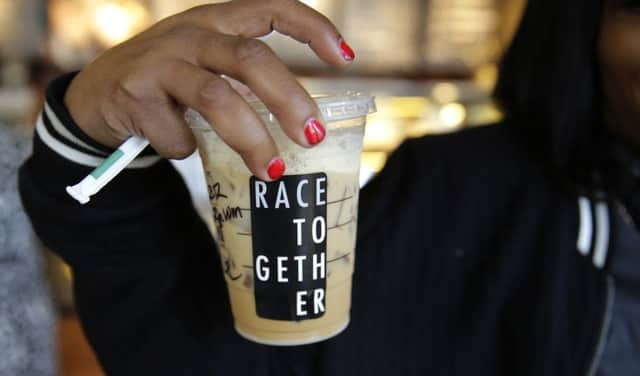Jane Bradley: Tackling racism? Wake up and smell the coffee


It also issued a questionnaire of race-related conversation ideas to help people discuss the issue of race, which must have had most readers chewing off their own elbow in embarrassment.
Needless to say, the American public wasn’t impressed.
One Starbucks executive, Corey duBrowa, received so much abuse on Twitter that he was forced to delete his account.
Advertisement
Hide AdAdvertisement
Hide AdThe main criticism was that they were trying to jump on the bandwagon of anti-racism in a politically charged America in a bid to sell more skinny caramel lattes and blitzed up tall raspberry crema frappuccinos. Well, that worked, didn’t it?
No, I would imagine that the main aim was to help meet its corporate social responsibility targets, which all big companies have to do these days. And if they didn’t do that, they would be even more vilified.
Starbucks, like it or not, has influence. However much the hipster stream appears to be mainstream – “NO-ONE is drinking coffee in chain cafés any more. We all frequent the cutesy joint where we know exactly which Brazilian farmer grew our coffee beans and where the tips jars have oh-so-hilarious and not-at-all-twee notices asking for pin money to ‘help us write great music and do our art’” – that, in the real world, is clearly not true.
Like it or not, a lot of people still buy coffee at Starbucks. And Costa. And Cafe Nero. Starbucks alone has more than 21,000 shops, worldwide. Therefore, a message that Starbucks puts out gets to a lot of people.
So, here’s a suggestion. Maybe, just maybe, this campaign was launched with good, if misguided, intentions. Starbucks will employ whole teams of people just to come up with ways in which they can give back to the community – not out of the goodness of their heart, I’m not that naive – but because they have to, and it’s their job.
And maybe, just maybe, they decided, if they’re going to do good, why not try to do good well and make a difference?
Of course, the people they employed to come up with this latest stunt will probably be on their way to collect whatever the American version of a P45 is as we speak. But that doesn’t mean they didn’t try to do their best. They’re probably graduates. Those breathy, idealistic interns who think they can change the world. They saw what happened in Ferguson and subsequent incidents of a similar nature and believe it is in their gift to fix it.
“If we get people to talk about it,” they’ll say, “that will solve the problem. That’s what’s missing in US race relations. A CONVERSATION. People need to engage. And Starbucks is the place to do it.”
Advertisement
Hide AdAdvertisement
Hide AdThey probably had campaign planning boards depicting people of all the colours under the rainbow clutching a Starbucks cup and smiling, nodding thoughtfully at each other as they work – while picking up a quick caffeine fix at their friendly neighbourhood Starbucks – on solving gang warfare, institutional racism and racist online trolling all in a single five-minute coffee break.
It all sounds lovely, in theory. Of course, in practice, people thought they were mad. They were criticised for encouraging chat which was deemed “not suitable” for coffee shops. It was insisted that they were just wanting to make more money off the US race crisis.
The backlash was so extreme that chief executive Howard Schultz this week called a halt to the cup-writing part of the campaign, claiming it was always planned to run for only a week.
Obviously. A week is long enough to stamp out racism, eh Howie?
But the thing to remember, mockery aside, is that the campaign was trying to stop racism. It wasn’t a campaign to encourage people to murder each other or be rude to a passing stranger. Its aim – even if stupidly directed – was positive.
Perhaps we could just stop with the negativity. Say, “Starbucks, that was a bit of a daft idea. Oh and you’re still not paying enough corporation tax in Britain, so we can never be friends, but I appreciate what you were trying to do.” Because if we stop people from trying daft ideas, we might lose out on some really good ones.